#academic pseudoscience
Photo
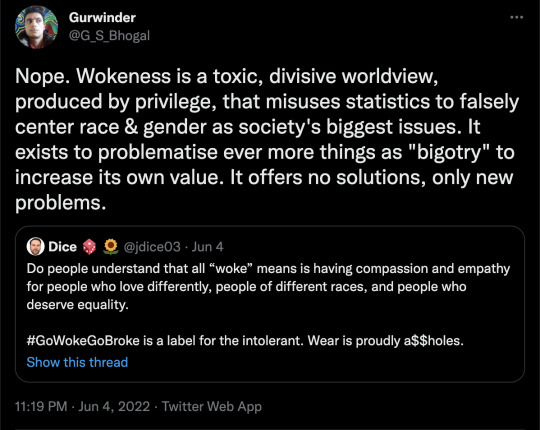

"All Xianity means is love and peace for all. Also, burn in hell, heathens.”
#Gurwinder#wokeness as religion#cult of woke#woke activism#wokeism#woke#problematics#problematize#woke privilege#bored and privileged#academic pseudoscience#gaslighting#Motte and Bailey fallacy#Motte and Bailey#religion is a mental illness
20 notes
·
View notes
Text
written up to page 8/10 of my freak based biography and its now devolving rapidly into racist pseudoscience so I think I'm doing pretty well considering the course material of this class
#nnstuff#rambling#racism mention#the thing is we learn a lot about freaks and freakshows and#a significant amount of freakshows are based on racist pseudoscience#or just racism in general#and im writing from the perspective of someone attempting to make an academic looking paper#to back up their racism and stuff#its funny. to me.
3 notes
·
View notes
Text
love piltdown man documentaries bc of the hilarious moment when they’re reviewing the various theories about who did the hoax/made the fraudulent fossils and then out of nowhere ITS ARTHUR CONAN DOYLE WITH THE STEEL CHAIR
#academic grudges here desire for fame there. missing link perception bias??? SHERLOCK HOLMES’ CREATOR’S PRANK ON THE#SCIENTIFIC COMMUNITY FOR CLAIMING HE DIDNT UNDERSTAND EVIDENCE??????#text✨#anth n arch#there’s no CONCRETE evidence he was responsible but it’s hilariously plausible#at least. as far as i know#we FINALLY got to fossil hominins in bioanth and we’re talking about pseudoscience babyyyyyy hell yeah#anthropology✨
4 notes
·
View notes
Note
Hi, I’m looking to dip my toes into archaeology so I can get a clearer idea of what I want to do with my life. What easy to mid-level projects would you recommend for toe-dipping purposes?
Hey, thanks for asking! Love when people want to learn more about archaeology!
This will be very dependent on where you are, because I'm in western Canada, so that's the area I know best when it comes to archaeology things. If any of my American, Australian, or east coast archaeology people want to add their own things that would be great!
First thing I'd recommend is that you find the nearest university anthropology department that offers archaeology classes. You don't have to take any, but find out what's around, and who their archaeologists are.
In southern BC, there's a few schools that offer archaeology field assistant programs, too. These are usually a few months long, and fairly affordable. They won't teach you the academic side of archaeology, but they also don't require you to spend the time and money to get a 4-year degree. They will teach you how to map sites, document artefacts, and do shovel tests, which is basically the hands-on stuff of day-to-day archaeology. This sort of thing will tell you if this is the type of work you want to keep doing, at which point you can get a degree, or even a job with a CRM company, depending who's hiring and what they're looking for.
If you feel like spending some money, or if you're already in school and have some elective slots, I recommend taking an intro to archaeology course, if your school has one. If you're nowhere near a university with archaeology classes, online schools also offer them (such as Athabasca U in Canada), and they're reasonably affordable.
An intro archaeology class (usually a second year class, but they don't generally have prerequisites) will teach you about what archaeology is, what it can do, the science we use to reconstruct the past, and the methods we use to collect artefacts. It will also talk about the history of archaeology, misconceptions and pseudo-archaeology, why we're nothing like Indiana Jones, and some of the important people and places in the field.
It will also give you the tools to think critically about how archaeology and pseudo-archaeology are discussed in media and pop culture, which is super important if you want to learn about this stuff on your own.
If you're not able or interested in taking classes, there's lots of ways to recreationally learn on your own. Archaeology magazine is a pretty reputable publication, and they write for interested amateurs rather than archaeologists, so it's fairly easy to read. A year's subscription runs about 30$, and you can find them at some newspaper and magazine stores depending on your location.
The PBS First Peoples miniseries is also one of my favorite archaeology documentaries. It has an episode for each continent, and talks about how humans got there and what we know about them in the archaeological record. Most National Geographic documentaries on archaeology are also pretty solid too, but the old ones are often out of date.
So as a basic breakdown: if you're interested in working in the field, try to take a course that offers hands-on experience and training. These can be short, so you don't have to jump right into a years-long degree.
If you're just interested academically or recreationally, online classes or independent research are probably a better bet.
Happy studying! If you have more questions I'd be happy to answer them, and I'm sure most of the archaeology side of Tumblr would as well.
#archaeology#university#education#asks#academic asks#archaeology asks#welcome future archaeologists#the only thing i would say about studying archaeology on your own without formal education in it#is that the media and general public are really weird about it#quite a lot of what is marketed as archaeology is very much not#like ancient aliens and the other conspiracy theories#and even some scientific programs make room for really bad takes#like the ice bridge documentary about the solutrian hypothesis (which is racist pseudoscience)#so its worth reading up on the things they present from actual archaeologists
4 notes
·
View notes
Link
Breeding banker misanthropes
#eugenics#America#elites#academics#bankers#pseudoscience#arrogance#Nordic master race#Carnegie Institute#Cold Spring Harbor#Harriman#Rockefeller#Sanger#sterilization#reproduction
0 notes
Text
you know i was thinking about it and since both the force and the inner workings of the human mind are arguably non-observable phenomena i think force-based academia should look a lot like psychology. current arguments and achievements of note include:
are the living and universal force actually different???
are the living and universal force actually connected at all???
those two factions of academics who hate each other's guts and theories and methodology (feat. pragmatists who figured out that the theories work together really effectively when practiced??? just saying)
FIGURING OUT WHY IT WORKS IS SECONDARY TO THE FACT THAT IT DOES WORK, JOCASTA
YOU CANNOT JUST DO THINGS WITH THIS METHOD WHEN YOU CAN'T ESTABLISH ITS SCIENTIFIC VALIDITY, YODA
that one researcher who accidentally won the space nobel prize in physics while trying to figure out how it is Physically Possible for the Jedi to do That One Thing
we have no empirical evidence that "the force" exists and therefore we can ONLY make conclusions based on observable events--- (loud angry yelling)
incredible amounts of popular misinformation and pseudoscience being distributed to the public still somehow
psychometric abilities: discrete or dimensional?
look. this experiment was completely unethical and we would never do anything like it today BUT---
this used to be true but then we told people about it and it changed as a result of that awareness. no we're not lying to you----
everything can be 100% traced back to a biomedical source
nothing can be 100% traced back to a biomedical source
force abilities are actually linked to overarching social factors like socioeconomic status of parents and--- *yelling from the back* OKAY BUT WHAT DO WE DO WITH THAT
look. listen. 60% applicability is golden in this field. you're a hard science researcher you wouldn't understand how hard it is to study an invisible energy field with a mind of its own
and, of course, the interdisciplinary argument staple
that isn't actually a real science :/
647 notes
·
View notes
Note
hi! i’ve been following you for a bit and seen you post abt taking nutrition courses, and i was wondering if you could talk about how you found/vetted your program? i have a community-oriented foodservice job and i’m interested in learning more about nutrition, but i know there’s a lot of dubious stuff/outright pseudoscience in the field so i’m wary of just signing up for the nearest/cheapest class.
So if you're looking at doing nutrition in a serious academic in the US way you need to take courses in an ACEND accredited program; there is an industry compliance standard that is required for RDs/RDNs so I started from there and worked backwards. I looked at state schools in my area that had programs on that list, then looked at community colleges in my area. California has pretty strict rules about accredited community colleges and state colleges in terms of what is transferable and transfer-ability is one of the better markers of a program that is not hot garbage. The school that I'm currently at has a program that complies with the Cal State requirements for an AS-T (Associates of Science Transfer) degree for Nutrition. There's another nearby school that has a more comprehensive program that offers both an AS-T and further lower-division nutrition classes.
If you're not thinking about becoming an RD/RDN (which at this point requires an MS in nutrition, a 10-month internship, and board certification) but want to learn more, I'd still say that working backwards works and you will likely be well served by seeing which schools in your area have an accredited program, which community colleges - if any - they accept transfers from, and signing up for basic classes.
If you're interested in doing an online class, it looks like there's a free class (the audit option is free) on basic nutrition offered through EdX from UC Riverside - this course outline looks very similar to basic nutrition classes I've taken.
The thing is that in some ways nutrition is pretty simple; there are essential nutrients, we need to make sure to get enough of them, a lot of people don't get enough of them, and most people's nutrition can be improved by eating a varied diet that includes many fruits and vegetables with sugar and some kinds of fats in moderation (but everyone needs protein, carbohydrates, and fats as part of their diet).
In other ways nutrition is tremendously complicated, highly specific to individuals, and people look at it as a silver bullet to solve all problems. And the really frustrating thing is that if you've got certain kinds of issues (celiac disease being one example that I'm intimately familiar with) then proper nutrition IS actually a silver bullet. But it's not a silver bullet for, say, heart disease or diabetes (both of which *interact* with the foods a person consumes, but are likely not purely caused by food consumption and may not be significantly mediated by nutritional care alone).
And that makes it a field ripe for charlatans!
But if you're doing community-oriented food service specifically i think that you're probably going to do well looking into programs for nutrition for public health and looking at accredited local schools. If you can't do that, check on what's available from schools that are ACEND accredited but have online classes through stuff like EdX - the UC Riverside program falls into that category, and there were classes from Arizona State University - which has a really widely known, accredited, and popular nutrition program - in that same category.
But. Yeah. I'm sorry. The field is kind of a nightmare and huge chunks of it are very misleading and even if you're looking at well vetted stuff there's going to be some garbage and it's going to depend a lot on the age of the program and how long people have been teaching in that program. It's a mess! It's a fascinating mess but it's a mess nonetheless!
114 notes
·
View notes
Note
i think you're qefinitely just wrong anq being "in a different universe" has nothing to do with it, put now i want to know which barts you think aren't real.

=> I will be answering this on Mod Remele's behalf since I don't feel it would be particularly beneficial for her to deal with further provoking on this matter => However, I think it's quite clear that she would have been referring to this quote; "[...] as cusps, brights, dulls, pigment shifts, and other color related mutations result in a rejection from most lusii," (Eel, Beforus-Cringe-Collector, '23)
=> 'Cusps' are extraordinarily well known to be a fictional type of troll invented for the popular book series In Which A Seadweller Is Born Also A Highblood And Unites The Two Castes In An Ultimate Form Of Water Based Clownery Etc (4675 AE) => In the sweeps since this book was released, the rare and fictional spliced troll caste appearance (commonly referred to as 'Cusps') has grown in popularity online => However, it has never been recorded in any living troll and is consequently not based in any reality => The idea of using this term in an academic context is honestly quite laughable
=> "Brights" and "Dulls", in a similar manner, are words that to my knowledge find their source in the theory first published by docterrorist Anrwir Belshr (5200), who proposed that there may be variations in the set blood colors of the existing caste system => Particularly 'Saturation Shifts', which in his hypothesis were unique to most trolls and could be drawn in scale => However this was later proved unfounded by Arioch Temter in a responsive study (5220) => Who was able to demonstrate through multiple test subjects that variations in 'Saturation' across trolls of the same caste was only found in anecdotal evidence => These were discovered to be caused by oxygenation levels, and occasionally dissimilarities in the individuals' diet, fitness, and overall health => The idea that blood within the same caste of individuals can be different is really nothing more than pseudoscience at this point => And continuing to spread this kind of information as fact or without at least warning of its existence as anecdotal is misleading and quite inappropriate for a scientist
=> "Pigment Shifts" is a term that can refer to multiple different conditions => Some of which (e.g. the "Iridescent blood" had by magic users in popular fantasy television show In Which Occultist Ritual Holders Attempt To Summon Spirits Without Psionics Etc (5525)) is purely fictional => Others (such as non-caste blood colors) are real and have been recorded for millennia, though it is inappropriate to speak about in detail => They are more commonly referred to simply as blood-color mutations
=> Grouping all of these terms together is something I would consider unfounded and even astounding in academics => Rather it is something you see by young fandom enthusiasts on online forums much like Grumblr => It was entirely appropriate for Mod Remele to regard these statements with suspicion => As more than half of them were completely non-scientific in nature
=> Really, she was actually being quite generous to assume the troll in question was from an "Alternate Dimension" => Due to the extremely unprofessional taunting she's received since responding to that, I think it's much more likely that these trolls do not take their science seriously whatsoever => Which is a shame => But not our fucking problem
#=> Do not attempt to mock young miss Remele again#=> I will not be quite as nice next time#=> Mod Galekh
22 notes
·
View notes
Text
Respectability Politics in CDDs
🗝️🏷️ OEA flavored syscourse
I know that fawning is a survival mode, but survival modes have never been an excuse to cause harm. By trying to appease and fit into a social group that doesn’t want us, we are intentionally discarding our most vulnerable peers.
If you’ve been around long enough, you’ll have seen some of these themes thrown around in every wider community a subgroup belongs to:
In medicine, psychology is often considered a soft science. Practitioners don’t have to believe in any of the theories or evidence to do their jobs, so they discount the whole field as less than or a pseudoscience
In psychology, trauma care is often considered a specialty. Clinicians can find clients without building safe relationships for disclosure, so they don’t know about and don’t treat trauma. People with trauma disorders are passed off as too complex or volatile for most support people
In trauma care, dissociation is a niche that clinicians don’t need to know about. Many people, caregivers and patients alike, don’t believe in repressed (dissociated) memories.
If a caregiver is informed about dissociation, that doesn’t guarantee they know about DID. They can find clients without validating or believing in any CDD, and can be downright venomous towards clients with those disorders (or CD structures in general)
In CDD treatment, OEA is an often considered conspiracy theory. Regardless of the actual story, clinicians will pass by OEA survivors as too much, or simply delusional.
In OEA circles, not everyone believes in mind control. They treat it as a buzz word, denying its possibility while describing it in practice with slightly different words. Even OEA circles might not believe in dissociation or CDSs, let alone programmed CDDs
In programming survivor circles, any survivor whose group wore cloaks, used candles, had fancy machines, or called themselves a secret society or government (by name or not) is discounted in an attempt to gain wider recognition
We all throw each other under the bus in an attempt to board ourselves, and that bus does not want us as passengers. It’s almost always a means of looking more believable to the people who don’t care to believe us, to present ourselves as respectable so one part of our collective narrative can be heard.
And it doesn’t work. If you can gain recognition by climbing a pile of bait, you can only hope nobody else tries to climb up you. Sometimes the group you are trying to squeeze into notices on their own that you look a little too different from them, or a little too similar to the people you stand on.
If we can get a piece of our community recognized by research we can replicate and arguments we can reuse, that’s a good thing. But if you were lucky enough to be included in that piece, turning your back on the people who were you is nothing short of hypocrisy and betrayal.
The rest of us don’t go away because you got lucky. And it is luck; as much as I love a good essay, what we need to get the rest of us to that level is evidence. Evidence that requires brain scans and chemical linkage, because we aren’t believed when we testify ourselves. Do you see how this a resource problem? Do you see how it isn’t?
People with degrees are qualified to record our experiences because they have access to education, the academic formats and vocabulary, the multifocal background. If you aren’t using those same tools, you have no reason to require them of others. This is why community isn’t reliant on academia, and why the cultural group is different than the medicalized group. We were the same, and then we weren’t. Subgroups exist because you left us behind.
#oea#tw oea#ramcoa#tw ramcoa#tbmc programming#cdd system#adaptive system#traumagenic system#complex dissociative disorder#dissociation#psychology
11 notes
·
View notes
Text
filipinos and people speaking to/about filipinos suffer from the same illness and that is the pathological need to remind us that we have been colonized. we can not exist without being told we owe this or that to our colonizers or to some other foreign origin. solicited or unsolicited, they will do it. in an academic setting or under random throwaway comments online, they will always bring it up. we are subjected to measures of cultural, racial, and linguistic purity that does not exist anywhere and which no people on this earth could ever pass.
using spanish, english, malay, hokkien, sanskrit loanwords? that means our languages are nothing but creole to the core. cooking balbacua or caldereta? well, they’re not really “our” dishes; we just remixed them and then we eat them. practicing christianity or islam? i guess nothing about our faiths must be indigenous. we were colonized by the spanish? that makes us more latino than asian actually… or maybe we’re neither latino nor asian but a secret third thing - polynesian! et cetera, et cetera.
don’t even get these people started on popular race science (i.e. pseudoscience) about the so-called origins of filipinos. they sound like reincarnations of johann blumenbach and henry otley beyer with their nonsensical ramblings about the three waves of migration, “mongoloids,” and the “malay race.”
18 notes
·
View notes
Text
there's literally nothing more exhausting than having ppl/relatives send you batshit insane crank pseudoscience that is tangentially related to ur field of study bc they love you and want to show you they care about what u do for a living. you can't just call out the article for being nonsense, it'd be the academic equivalent of a small child baking you a cake and you throwing it on the floor bc they fucked up the icing (and the cake mixture, and the baking process), but the knowledge i'm leaving them to believe in nonsense is tearing me apart. maddening
#i may be slightly neurotic#tbc i do try to comment on what they send me slightly and myb offer some better sources if they seem interested in the subject
11 notes
·
View notes
Text

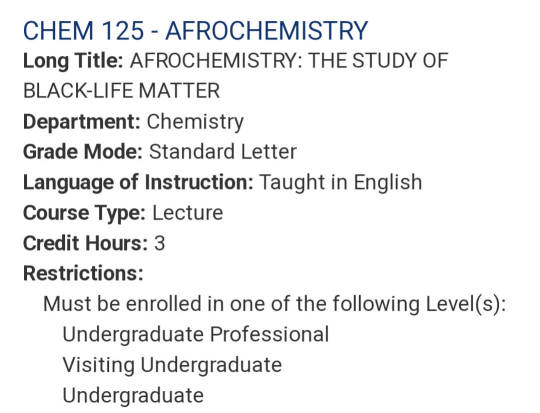
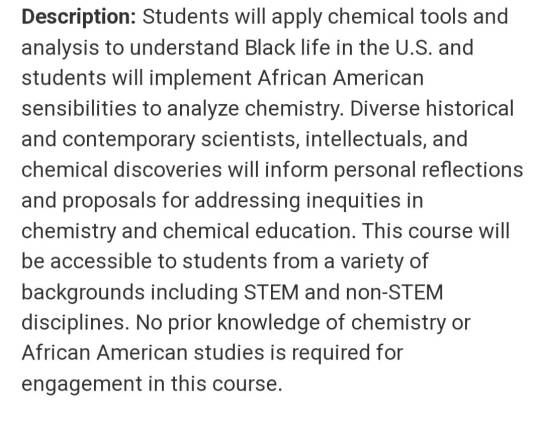
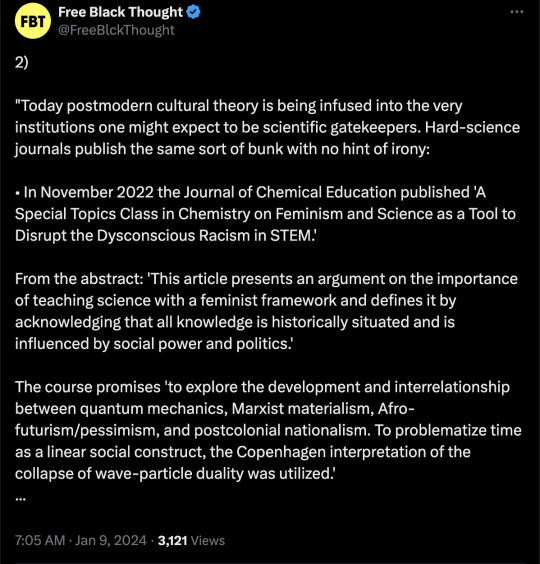
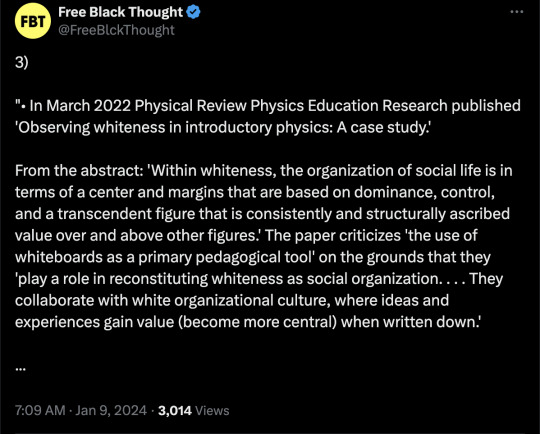
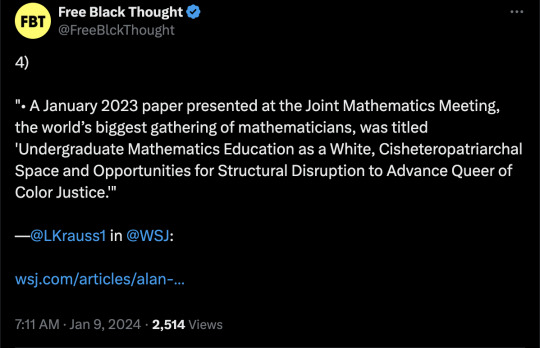
https://www.wsj.com/articles/alan-sokals-joke-is-on-us-as-postmoderism-comes-to-science-23a9383c
By: Lawrence Krauss
Published: Jan 5, 2024
When I taught physics at Yale in the 1980s and ’90s, my colleagues and I took pride in our position on “science hill,” looking down on the humanities scholars in the intellectual valleys below as they were inundated in postmodernism and deconstructionism.
This same attitude motivated the mathematician Alan Sokal to publish his famous 1996 article, “Transgressing the Boundaries: Towards a Transformative Hermeneutics of Quantum Gravity,” in the cultural-studies journal Social Text. He asserted, among other things that “physical ‘reality,’ no less than social ‘reality,’ is at bottom a social and linguistic construct” and that “the scientific community . . . cannot assert a privileged epistemological status with respect to counter-hegemonic narratives emanating from dissident or marginalized communities.”
Mr. Sokal’s paper was a hoax, designed to demonstrate that postmodernism was nonsense. But today postmodern cultural theory is being infused into the very institutions one might expect to be scientific gatekeepers. Hard-science journals publish the same sort of bunk with no hint of irony:
• In November 2022 the Journal of Chemical Education published “A Special Topics Class in Chemistry on Feminism and Science as a Tool to Disrupt the Dysconscious Racism in STEM.” From the abstract: “This article presents an argument on the importance of teaching science with a feminist framework and defines it by acknowledging that all knowledge is historically situated and is influenced by social power and politics.” The course promises “to explore the development and interrelationship between quantum mechanics, Marxist materialism, Afro-futurism/pessimism, and postcolonial nationalism. To problematize time as a linear social construct, the Copenhagen interpretation of the collapse of wave-particle duality was utilized.”
• In March 2022 Physical Review Physics Education Research published “Observing whiteness in introductory physics: A case study.” From the abstract: “Within whiteness, the organization of social life is in terms of a center and margins that are based on dominance, control, and a transcendent figure that is consistently and structurally ascribed value over and above other figures.” The paper criticizes “the use of whiteboards as a primary pedagogical tool” on the grounds that they “play a role in reconstituting whiteness as social organization. . . . They collaborate with white organizational culture, where ideas and experiences gain value (become more central) when written down.”
• A January 2023 paper presented at the Joint Mathematics Meeting, the world’s biggest gathering of mathematicians, was titled “Undergraduate Mathematics Education as a White, Cisheteropatriarchal Space and Opportunities for Structural Disruption to Advance Queer of Color Justice.”
Undergraduates are being exposed to this stuff as well. Rice University offers a course called “Afrochemistry: The Study of Black-Life Matter,” in which “students will apply chemical tools and analysis to understand Black life in the U.S. and students will implement African American sensibilities to analyze chemistry.” The course catalog notes that “no prior knowledge of chemistry or African American studies is required for engagement in this course.”
Such ideas haven’t totally colonized scientific journals and pedagogy, but they are beginning to appear almost everywhere and are getting support and encouragement from the scientific establishment. There are also indications that dissent isn’t welcome. When a group of physicists led by Charles Reichhardt wrote to the American Physical Society, publisher of the Physics Education Research journal, to object to the “observing whiteness” article, APS invited a response, then refused to publish it on the grounds that its arguments, which were scientific and quantitative, were based on “the perspective of a research paradigm that is different from the one of the research being critiqued.”
“This is akin to stating that an astronomer must first accept astrology as true before critiquing it,” the dissenters wrote in the final version of their critique, which they had to publish in a different journal, European Review.
That sounds like an exaggeration, but in 2021 Mount Royal University in Canada fired a tenured professor, Frances Widdowson, for questioning whether indigenous “star knowledge” belonged in an astronomy curriculum. The same year, New Zealand‘s Education Ministry decreed that Māori indigenous “ways of knowing” would have equal standing with science in science classes. The Royal Society of New Zealand investigated two scientists for questioning this policy; they were exculpated but resigned. The University of Auckland removed another scientist who questioned the policy from teaching two biology classes.
In 2020, Signs Journal of Women in Culture and Society published an article by physicist Chanda Prescod-Weinstein titled “Making Black Women Scientists under White Empiricism: The Racialization of Epistemology in Physics.” Ms. Prescod-Weinstein wrote: “Black women must, according to Einstein’s principle of covariance, have an equal claim to objectivity regardless of their simultaneously experiencing intersecting axes of oppression.” This sentence, which dramatically misrepresents Einstein’s theory of general relativity, wouldn’t have been out of place in Mr. Sokal’s 1996 spoof.
Had an article like this appeared in 1996, it would have been dismissed outside the postmodernist fringe. But last year Mr. Sokal himself, noting that the article was No. 56 in the Altmetric ranking of most-discussed scholarly articles for 2020, felt the need to write a 20-page single-spaced rebuttal. The joke turns out to be on all of us—and it isn’t funny.
Mr. Krauss, a theoretical physicist, is president of the Origins Project Foundation and author of “The Edge of Knowledge: Unsolved Mysteries of the Cosmos.”
[ Via: https://archive.md/Bbmju ]
==
Don't forget this gem of ideological gibberish masquerading as both "science" and legitimate scholarship, when it's clearly neither.
Abstract
Glaciers are key icons of climate change and global environmental change. However, the relationships among gender, science, and glaciers – particularly related to epistemological questions about the production of glaciological knowledge – remain understudied. This paper thus proposes a feminist glaciology framework with four key components: 1) knowledge producers; (2) gendered science and knowledge; (3) systems of scientific domination; and (4) alternative representations of glaciers. Merging feminist postcolonial science studies and feminist political ecology, the feminist glaciology framework generates robust analysis of gender, power, and epistemologies in dynamic social-ecological systems, thereby leading to more just and equitable science and human-ice interactions.
#Free Black Thought#Afrochemistry#science#corruption of education#corruption of knowledge#fake domains#academic fraud#academic corruption#feminist glaciology#ideological nonsense#corruption of science#pseudoscience#woke#wokeness#cult of woke#wokeism#wokeness as religion#religion is a mental illness
5 notes
·
View notes
Text
Physiognomy is another one of those things we should be looking at critically, for anyone unfamiliar.
The simple, surface-level wikipedia definition is "he practice of assessing a person's character or personality from their outer appearance—especially the face." As a pseudoscience, it is related to phrenology.
Per the University of North Carolina's web project Race Deconstructed: Science and the Making of Difference, "physiognomy suffered from the biases of its practitioners, who tended to attribute positive qualities only to features associated with Europeans."
The same source also says "physiognomy could be used as a justification for treating non-white individuals differently, in society and in law."
There are also connections between physiognomy and eugenics, as well as between physiognomy and antisemitism- the "Jewish nose" stereotype and the character traits assumed to go with it is one example.
Given the ways that Dracula is described, both by Jonathan at the beginning and by Mina and others once he's in London, the connection between physiognomy and antisemitism should not be overlooked.
Indeed there is an academic paper on the subject, titled "The fear of the ‘Other’ and anti-semitism: Representations of the Jews in Punch and Bram Stoker’s Dracula in the light of rising English nationalism" by Stephanie Winkler of Oxford University available free online for anyone looking for something more in depth.
#dracula daily#dracula#context#i haven't actually read the paper yet#but I plan to#several academic papers also link physiognomy to the Holocaust#as well as antisemitism more generally#also racism#and eugenics#i didn't include the links because tumblr is weird about links#but a google search should get you plenty#mine#My posts#my meta#My writing
61 notes
·
View notes
Link
"Scholarship" at the University of Toronto
#Canada#Ontario#University of Toronto#Science Table#Fisman#academic fraud#pseudoscience#modelling#manipulation#conflict of interest#vaccines#fear mongering#segregation#social control
0 notes
Quote
Money aside, here’s what I mean by Rogan’s having “revealed something important.” It’s something that also contributes to the answer to my question. Rogan issued the challenge publicly because these challenges to “debate” are not about science, medicine, or getting at any sort of accurate information or truths to the public. They are theater, nothing more. Real scientists debate all the time in the academic literature, at conferences, and among themselves as they work. Staged “debates” like this are not really debates at all. They are opportunities for cranks to appear on the same stage as a respected scientist like Dr. Hotez and then firehose, Gish gallop, make crap up, misrepresent and cherry pick studies, and basically flood the zone with nonsense that sounds plausible to people without the relevant scientific background, after which they inevitably declare victory. I’ve explained more times than I can remember now why agreeing to staged debates like this with a crank like RFK Jr.—especially one moderated by a credulous twit like Joe Rogan—is a very bad idea for scientists, physicians, and skeptics. Even scientists or science communicators who not only possess strong public speaking and debating skills but are very knowledgeable about the relevant conspiracy theories and misinformation likely to be employed can often be hard-pressed to deal with a glib pseudoscience-pushing crank. (Remember, RFK Jr. is a lawyer and used to debating in the form of arguing cases.) We, after all, are bound by science and the truth. Cranks like RFK Jr. are not. Also, RFK Jr. lies all the time about a number of things. For example, he lied on Joe Rogan’s podcast about his conversation with Dr. Paul Offit, held not long before he started spreading antivaccine misinformation. He’s also been lying by claiming that big pharma got Deadly Immunity retracted.
RFK Jr. and Joe Rogan: Putting the old denialist technique of bad faith “Debate me, bro!” challenges on steroids
9 notes
·
View notes
Note
Hello! I was wondering if you could you talk a little about types of careers that have to do with botany, ecology, ethnobotany, etc? I do native plant landscaping and love it but I don't think it's a long-term option because it's hard on the body. I'm wondering what I can do next but my undergrad isn't related to any of this. What are some examples of jobs and what experience/degrees do they require? Are there options outside of academia? Thank you!
This is a tough question - both of us took the academic track in botany initially, and one of us is still a botanist! A lot of ecology/biology/botany jobs do want some sort of degree, although for some positions a general biology B.S. or even an associate's degree will work.
However, you have some experience with native plants from your current job, so it's possible you might be able to find something related to native plant ecology. You might potentially look into wetland delineation or a similar industry job that involves knowledge of native plants. There are a number of other ecology jobs related to botany in industry that you might be able to pursue with your experience, although they might be fairly entry-level. Friends of mine without a deep background in academia have gone into pathogen identification at plant nurseries and seed identification for independent laboratories that test nursery stock.
If you have experience with GIS programs, such as QGIS and ArcGIS, you may be able to find a GIS-related role at a university or botanical garden, too.
Volunteering can be a good way to network, although in our opinion, a lot of the best volunteer opportunities will be through academia. Botany labs and herbaria often have trouble finding volunteers, because quite simply, there are a lot of "sexier" volunteer opportunities offered by large carnivore research teams! Who doesn't want to collar grey wolves, after all?! University volunteer programs frequently email job listings to volunteer mailing lists, and if you participate in group activities, other volunteers, professors, and herbarium curators might have some job opportunity tips as well.
We also won't discount the option to go back into academia and get a master's degree or doctorate, too. We'd suggest volunteering in tandem, because this can be a great way to get really powerful references if you don't have any in the field already. If you do this, be sure to tour the universities and meet one-on-one with the advisor and program members you'd be working with. Unfortunately, if you're in the United States, studying for the Graduate Record Exam (GRE) can be rather tedious, the test itself is expensive, and academic job simply do not way well, so we understand why someone would avoid this route.
We would advise staying away from bushcraft and herbalism. There's a lot of pseudoscience and overexploitation of plants occurring in these practices right now.
15 notes
·
View notes